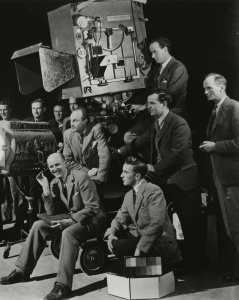By Richard Verrier
Once known for its stable management, Panavision in recent years has more resembled the revolving executive suite door of a Hollywood studio, with four chief executives in the last six years. The most recent, William M. Campbell, lasted less than three months on the job. "Anybody who uses Panavision equipment has to be concerned," said Richard Crudo, past president of the American Society of Cinematographers. "Our biggest concern is that something disastrous might happen and suddenly they're not with us any longer. That would be a major blow to the industry."
 Some of Panavision's problems parallel those facing other companies in the production industry. The company has been hit hard by the steep downturn that began last year during the Hollywood writers strike and the subsequent standoff between the major studios and the Screen Actors Guild. The economic recession also led studios to make fewer movies and advertisers to cut back on making commercials, further weakening demand for filmmaking equipment.
Some of Panavision's problems parallel those facing other companies in the production industry. The company has been hit hard by the steep downturn that began last year during the Hollywood writers strike and the subsequent standoff between the major studios and the Screen Actors Guild. The economic recession also led studios to make fewer movies and advertisers to cut back on making commercials, further weakening demand for filmmaking equipment.Panavision is a unit of Perelman's privately owned holding company, MacAndrews & Forbes Holdings Inc., which doesn't release the company's financial results. But people close to Panavision say camera and lens orders for feature films, which account for most of the company's revenue, are down 15% to 20% this year.
The company generated about $250 million in revenue in 2008, slightly below that of 2007. The company would not provide an estimate for total revenue in 2009. In response to the slowdown, Panavision laid off about 200 employees, reducing its total workforce to 1,200. It plans to consolidate offices, currently split between Woodland Hills and Hollywood, into a location in Burbank this year. The close-knit cinematography community first sensed things may not have been going well at Panavision in April, when Perelman ousted Bob Beitcher, who had been CEO since 2003, after the two sparred over how to turn the business around. The news surprised many in the industry, where Beitcher was respected for his efforts to improve Panavision's service and upgrade its products.
Beitcher declined to discuss his exit, but said, "Panavision is dealing with many of the same issues as all the other service providers in the industry are." Beitcher was succeeded by Campbell, a former president of Discovery Networks USA who also had been an executive at ABC, CBS and Warner Bros. Television. But Campbell barely had a chance to unpack his boxes before Perelman asked him to step aside in June, after other executives complained that Campbell lacked an understanding of the business and was not sufficiently engaged in the day-to-day affairs of the company, according to people familiar with the situation.
But one person close to Campbell disputed that account and said he stepped down because Perelman didn't share his strategy to rejuvenate the company, which included beefing up the company's website and more aggressively taking on rivals like Red Digital Cinema, the Lake Forest maker of the Red One camera. Campbell, who will continue to work for the company as a consultant, declined to comment for this article.
He was succeeded by William C. Bevins, a longtime Perelman associate who had worked as a top executive at the billionaire investor's other Hollywood companies, New World Communications Group Inc. and Marvel Entertainment Inc. Bevins declined to discuss the management upheaval but said that "the most important thing right now is to make sure that we manage through this recovery and that as the economy improves we have equipped ourselves to provide not just the service, but the gear that will allow us to maintain and possibly even improve our market share." Despite the drop in business, Panavision still generates an operating profit and has cash flow of about $70 million, said people familiar with the company. But much of that goes toward servicing its debt, which is held by a consortium of banks headed by Credit Suisse.
"We can very effectively manage the debt level that we have," Bevins said. "But if at any point in time we have capital needs that go beyond that, we can always look to our shareholder [Perelman], and he's been supportive of us." Aside from a production slowdown, Panavision is grappling with a more fundamental shift: Its business was built around manufacturing and leasing costly, high-end film cameras. It was a model that worked well for decades, when its cameras and lenses became a fixture in Hollywood and had little competition.
But demand for film cameras has steadily declined in recent years. Although filmmakers still debate the merits of shooting on 35-millimeter film versus shooting digitally, the switch to digital equipment has been dramatic, especially in television, where studios have been pressuring producers to cut costs. Virtually all the TV pilots were shot digitally this year. Panavision rents digital cameras, including its well-regarded Genesis, which it developed with Sony Electronics.
But that camera is older and generally costlier to rent than rival digital models such as the Red One, which was developed by Jim Jannard, founder of eyewear and apparel company Oakley Inc. Interest in the Red camera soared after it caught the attention of filmmakers like Soderbergh and "The Lord of the Rings" director Peter Jackson, who used the camera to shoot a short war film, "Crossing the Line."
In addition to renting the camera, Red Digital Cinema sells its camera and accessories for about $30,000, making digital cameras affordable for filmmakers. By contrast, Panavision cameras aren't for sale and typically rent from $10,000 to $60,000 a week. "Suddenly the camera that nobody has access to, everybody has access to," said Brook Willard, a digital imaging technician who works with the Red camera and served as an advisor on "Southland" and "ER."
Bevins acknowledged that Panavision needs to more quickly adapt to the changing marketplace. To that end, the company recently acquired 15 Sony digital cameras for $35 million and is developing a new line of digital cameras. "We've decided to redouble our efforts to develop product for the digital marketplace," he said. "We can't rent what people don't want."





























































